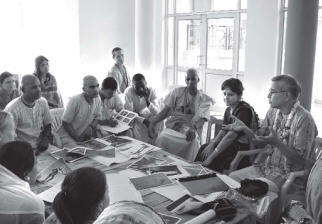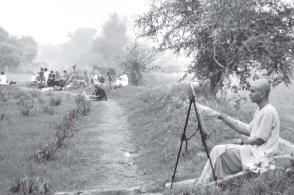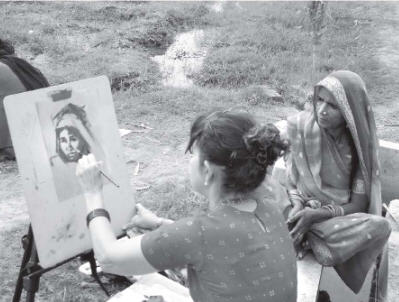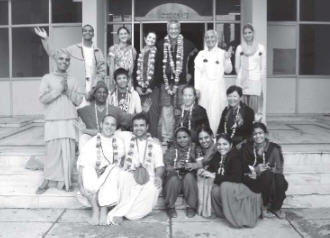Beyond pencil and colors: Two of Srila Prabhupada’s disciples
dedicate their lives to teaching transcendental art.

Vrindavana 2003: On the appearance day of Srila Prabhupada, I was sitting in a garden after lunch contemplating. “If only I could paint Krishna while staying in Vrindavana during Kartika,” I thought, “how wonderful it would be!”
I was attracted by the wonderful atmosphere of Vrindavana, the place where Lord Krishna performed all the pastimes I was craving to recreate on canvas.
My dream to paint in Vrindavana came true in 2007, when I was selected to participate in an art seminar organized by the Bhaktivedanta Book Trust (BBT).
The BBT, “Srila Prabhupada’s heart,” was created by Srila Prabhupada to publish his own books and other bona fide Gaudiya Vaishnava and Vedic literatures. These literatures are translated from Sanskrit and Bengali into English. Most of these books are also illustrated. In order to fulfill the growing demand of qualified linguists and artists, the BBT has introduced several training program. To train devotees in the Sanskrit language and in the skills of translating Sanskrit into English, the BBT founded at Govardhana the Bhagavata Vidyapitha. There students study the intricacies of Sanskrit grammar and the commentaries of our acharyas. To train devotee artists, the BBT conducts annual art seminars. There students are taught to draw and paint the Lord’s transcendental pastimes as described in the scriptures. One of these training programs is conducted in Vrindavana for three weeks during the month of Kartika.
Two of Srila Prabhupada’s artist disciples, Rama Abhirama Dasa and his wife, Dhrti Devi Dasi, teach this seminar. Rama Abhirama holds a degree in fine arts, and both have painted many masterpieces for BBT. I attended my first seminar in 2007 and then returned for the next three. I would like to share the great benefits I received.
Welcome to Vrindavana
Our venue is Radhe Dham, a spacious hall in Chaitanya Vihar, about five minutes’ walk from the Krishna-Balaram temple. With me are about twenty-five international students and artists. After a short introduction our teachers, Rama Abhirama and Dhrti read to us some of Srila Prabhupada’s statements about the art department. Then they show us some of their paintings.
Next come the practicals. They begin by demonstrating how to do a basic pencil sketch for composition, then a color sketch, and finally how to use the sketch to create a painting on canvas in oil. Even great artists like Michelangelo, Rembrandt, and William-Adolphe Bouguereau followed this procedure.
In the studio: sketching a live model from different angles; understanding shading and light; how to depict basic human anatomy, something very basic: how to hold a pencil! On field trips: selecting a scenic spot of beautiful Vrindavana forest, quickly sketching the landscape on a canvas paper, then painting with vibrant colors all within two hours. Then synthesizing both sketch and landscape, we are taught to create the transcendental form of the Lord using knowledge of ancient Indian sculptural scriptures, the silpa-shastras.

At every step Rama and Dhrti carefully guide each student.
Every morning at ten, we assemble in the studio and work on drawing human anatomy using a model. We learn to capture the essence of a particular pose within seconds by doing rapid sketches. It’s common to spend a lot of time describing details and missing the essence. These rapid sketches help us grasp the pose, understand it, analyze it, and then sketch it all within blocks of three, five, or ten minutes. The noon sessions are for portraits a painting of a person in which the facial expressions are highlighted.
We encircle a human model and quickly draw the face using limited colors. After the session, the models preview their portraits. “O my God! Certainly, that’s is not me!” they laugh. We too peek at each other’s illustrations and burst out laughing. I remember Srila Prabhupada’s comment on laughter as I once heard from his secretary, syamasundara Dasa. “Laughter,” Srila Prabhupada said, “is the difference between the ideal concept and the ground reality.” We certainly have a lot of difference between the original face of our model and our reproductions of it, so it’s quite funny.
I meet many devotees and make a few friends. There is Abhay, a gurukuli in his late teens. He is from Florida, USA, and his mother, Hrimati Devi Dasi, is a disciple of Srila Prabhupada. Interestingly, he has no art background, yet he has attended the art seminars for three consecutive years and now wants to make a career out of art.
Anandamayi Devi Dasi, on the other hand, has received training from several Russian art professionals. She is 22 and comes from Canada. She finds the detailed teaching of every aspect of drawing and painting substantially useful. Now she plans to work for the BBT to produce works of art and to paint for the Ottawa temple in Canada.
Age is no barrier for 60-year-old Australian Rasanandi Devi Dasi. She came to the seminar with a master’s degree in Fine Arts and years of painting experience at Australian temples. She now plans to train artists in Australia and wishes to paint for local ISKCON temples.
Vijaya Madhava Dasa, 25, is from Mumbai. Although he has a degree in art, it didn’t give him much confidence to paint. The seminar has given him lots of encouragement. He now helps BBT Mumbai in the art department.
Training And Encouragement

It takes a lot to be an art teacher. Most of us do not reach the expected results while painting. But both teachers come to each of us and heartily encourage us over even the smallest good thing in our work. They gently correct our mistakes and patiently encourage us to do better. They have been doing this every day we have been here with a smile on their faces. I am reminded of a statement by Srila Prabhupada: “Just like there is small fire in the charcoal. You fan it, and it will gradually become a big fire. So this Krishna consciousness movement is fanning that spiritual spark to come into full consciousness.” (Lecture on Srimad-Bhagavatam 1.15.44, 22 December 1973, Los Angeles) Our teachers make us feel appreciated as if we are already contributing significantly to the illustration of BBT books.
In academic settings, art instructors rarely paint alongside their students. Here, our teachers not only instruct us but draw and paint with us sketches, landscapes, portraits and like the rest of us, work to fulfill the seminar’s goal: that we each complete a painting.
Humility the Hallmark of a Vaishnava
With the last date of the seminar approaching, we are busy with our work, the final painting in which we show all that we have learned during our three weeks here. The studio is a mess. On the last day, I find our teachers carrying brooms instead of paintbrushes. They begin cleaning the studio, and I am amazed! They are accomplished artists, direct disciples of Srila Prabhupada, who have been rendering valuable service to ISKCON for more than three decades, yet there is not an iota of pride in their hearts. This is real humility. Srila Bhaktisiddhanta Sarasvati Thakura said, “Humility is the hallmark of a genuine Vaishnava.” Immediately some of us pick up brooms and join them. By cleaning the studio we feel satisfied.
Gaining a perspective
I thank Rama Abhirama and Dhrti at their residence, expressing my deep gratitude. I then give an interview on how I benefitted from their seminar. I had problems with painting perspectives. In painting a landscape, to gain perspective one paints objects in the foreground clearer than those in the background. Before attending this seminar, I was painting all the objects with the same colors and clarity, creating a flat image. Our teachers took us outdoors so we could observe for ourselves how things that are far away appear. By understanding these nuances, my recent paintings have clear and vibrant foregrounds and hazy backgrounds. It makes the paintings appear three-dimensional.

Similarly I learnt about something called as transcendental art while drawing human figures. How to paint the transcendental form of Lord Krishna while referring to ordinary unattractive human models? As an artist you naturally understand the proportions of a model, but when painting a transcendental figure you have to stretch those proportions. For example, what does it mean to paint eyes that look like a lotus petal? If you simply stretch the eyes out until they are the right shape, they would seem artificial. But if you paint realistic eyes, then that is not Lord Krishna. So you have to see how much to stretch. Similarly, Lord Krishna’s body is transcedentally tender and delicate, so you have to decide where to cut or add muscle tone so that the art becomes transcendental.
Srila Prabhupada says that we make thousands of times more spiritual advancement by serving Krishna in Vrindavana during Kartika than at ordinary times at ordinary places. That is the glory of Vrindavana. I am indeed grateful for receiving training on how to portray Krishna in Vrindavana. Indeed, Vrindavana is a place where art blends with devotion to Krishna.
The author would like to thank Gopala Bhatta Dasa, Pancaratna Dasa, the BBT and VIHE for organizing the Art Seminar every year.
Srila Haridasa Thakura Dasa holds a diploma in Mechanical Engineering. He has been serving full-time at ISKCON Chowpatty since 1998 and heads the art depeartment here. He also teaches Krishna consciousness to university students.
